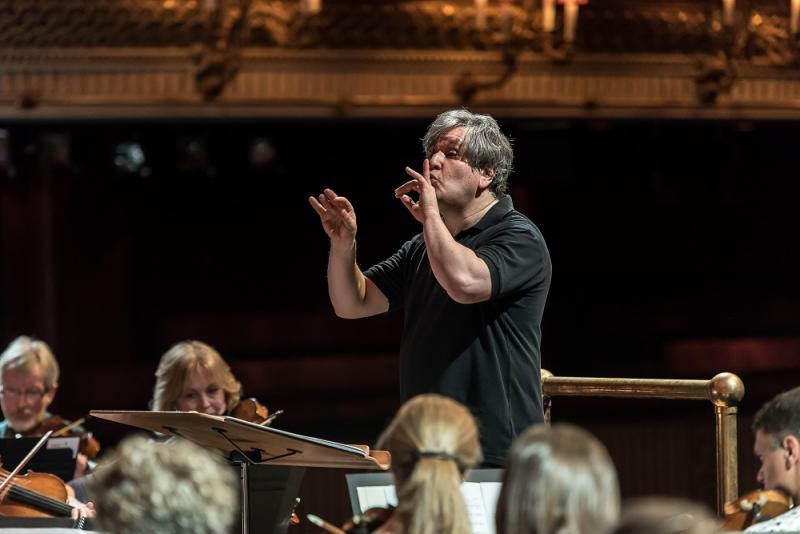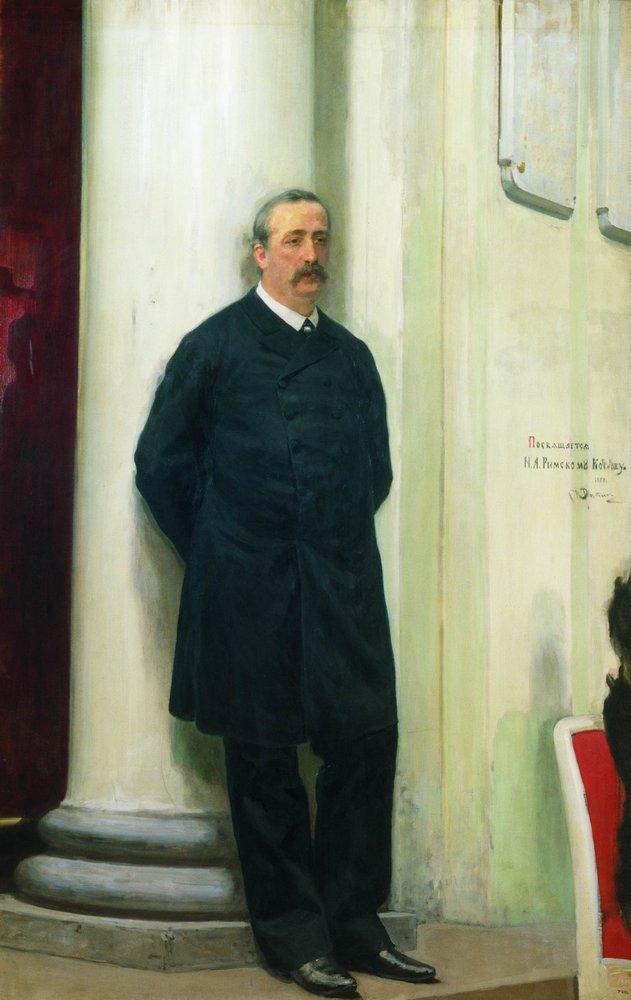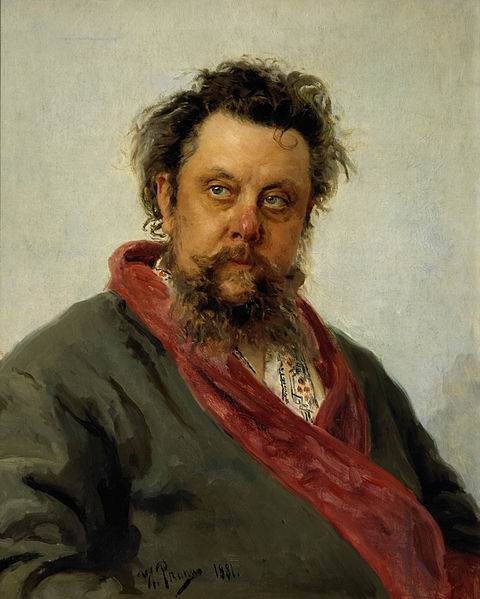The Mighty Handful, ROH Orchestra, Pappano, Royal Opera House | reviews, news & interviews
The Mighty Handful, ROH Orchestra, Pappano, Royal Opera House
The Mighty Handful, ROH Orchestra, Pappano, Royal Opera House
Lively Russian nationalist goody-bag not quite filled to the brim

What fun it must have been to attend any of the St Petersburg Free Music School concerts during the second half of the 19th century.
Balakirev and company might have looked a bit askance at the relatively short measure in the second of Antonio Pappano's annual programmes with his Orchestra of the Royal Opera House, a kind of contextual taster for the forthcoming Boris Godunov, but they would have loved his enthusiasm and energy, which extended to pleasant introductions to both halves of the concert.
 From a feast of colourful scores by "the Five", any number of courses could have been selected. Perhaps the only obvious one on Pappano's menu, apart from the minute-long "Flight of the Bumble-bee" from Rimsky-Korsakov's Tsar Saltan, was Borodin's Second Symphony, the real meat of the evening (the composer pictured right by Ilya Repin). Pappano got the Royal Opera strings to dig deep into the leonine offcuts from Prince Igor; at the other end of the scale, principal clarinet and horn wrought magic at the beginning and end of the bardic song in the slow movement.
From a feast of colourful scores by "the Five", any number of courses could have been selected. Perhaps the only obvious one on Pappano's menu, apart from the minute-long "Flight of the Bumble-bee" from Rimsky-Korsakov's Tsar Saltan, was Borodin's Second Symphony, the real meat of the evening (the composer pictured right by Ilya Repin). Pappano got the Royal Opera strings to dig deep into the leonine offcuts from Prince Igor; at the other end of the scale, principal clarinet and horn wrought magic at the beginning and end of the bardic song in the slow movement.
All the performance lacked was depth to the lyric melodies, both here and in the bird-rich forest and battlefield of Rimsky-Korsakov's Invisible City of Kitezh (we could have done with the wedding balalaika imitations and Straussian apotheosis of the suite from the opera, too). Funny, but I look back with fondness on the heart of dark oak Gergiev used to get in such themes during his heyday at the Mariinsky/Kirov Theatre. But then the Royal Opera House as a concert venue didn't help with warmth or perspective. Enough to make one all the more grateful for the adequate Festival Hall or the Barbican; it's dry and pitiless to the orchestra on the stage, for all the handsome wood surrounds.
For that reason the original, incoherent but exciting romp of Musorgsky's original 1867 St John's Night on Bare Mountain (the composer pictured below by Repin, at the end of his life) came off best. Its bald scoring came across as positively hair-raising, from the first fortissimo skedaddling of the witches – not flying in from a distance as in Rimsky-Korsakov's more familiar 1882 arrangement – to the whole-tone romps of the fierce conclusion. Rimsky arranged it all better as a sequence, of course, but Pappano made a ferocious argument for the rawness of the original.
 An interlude in the short second half came in the shape of the Prelude to Act III of Cui's William Ratcliff. A vocal soloist would have been necessary to give a fair portrait of this once-popular operatic composer – he wrote no less than 15 operas – and all the brief setting-up of love music in the midst of the murderous Scottish mayhem Cui drew from Heine's bloody original was to suggest a heart-on-sleeve kinship with later Italian intermezzos. (Mascagni's Guglielmo Ratcliff, of course, has had an airing; Cui's, never to my knowledge.)
An interlude in the short second half came in the shape of the Prelude to Act III of Cui's William Ratcliff. A vocal soloist would have been necessary to give a fair portrait of this once-popular operatic composer – he wrote no less than 15 operas – and all the brief setting-up of love music in the midst of the murderous Scottish mayhem Cui drew from Heine's bloody original was to suggest a heart-on-sleeve kinship with later Italian intermezzos. (Mascagni's Guglielmo Ratcliff, of course, has had an airing; Cui's, never to my knowledge.)
Fireworks ended the show with Balakirev's giddying oriental fantasy Islamey, exoticism from the fringes of the Russian empire being a key tenet of the Handful's nationalism. Here there might have been a showing of self-orchestrated genius in the shape of the slow-working leader's Overture on Three Russian Themes or symphonic poem Tamara, but Pappano needed no justification for choosing the arrangement of the fiendishly difficult piano piece by his fellow-Italian Casella. Respighi couldn't have done a more coruscating job on it, and if you didn't travel home singing the gorgeous, cor anglais-led oriental melody at the heart of the work as I did, that wouldn't have been the fault of Pappano's brilliant finale.
rating
Share this article
The future of Arts Journalism
You can stop theartsdesk.com closing!
We urgently need financing to survive. Our fundraising drive has thus far raised £49,000 but we need to reach £100,000 or we will be forced to close. Please contribute here: https://gofund.me/c3f6033d
And if you can forward this information to anyone who might assist, we’d be grateful.

Subscribe to theartsdesk.com
Thank you for continuing to read our work on theartsdesk.com. For unlimited access to every article in its entirety, including our archive of more than 15,000 pieces, we're asking for £5 per month or £40 per year. We feel it's a very good deal, and hope you do too.
To take a subscription now simply click here.
And if you're looking for that extra gift for a friend or family member, why not treat them to a theartsdesk.com gift subscription?
more Classical music
 Two-Piano Gala, Kings Place review - shining constellations
London Piano Festival curators and illustrious friends entertain and enlighten
Two-Piano Gala, Kings Place review - shining constellations
London Piano Festival curators and illustrious friends entertain and enlighten
 Echo Vocal Ensemble, Latto, Union Chapel review - eclectic choral programme garlanded with dance
Beautiful singing at the heart of an imaginative and stylistically varied concert
Echo Vocal Ensemble, Latto, Union Chapel review - eclectic choral programme garlanded with dance
Beautiful singing at the heart of an imaginative and stylistically varied concert
 Scott, Irish Baroque Orchestra, Whelan, RIAM, Dublin review - towards a Mozart masterpiece
Characteristic joy and enlightenment from this team, but a valveless horn brings problems
Scott, Irish Baroque Orchestra, Whelan, RIAM, Dublin review - towards a Mozart masterpiece
Characteristic joy and enlightenment from this team, but a valveless horn brings problems
 Classical CDs: Voice flutes, flugelhorns and froth
Baroque sonatas, English orchestral music and an emotionally-charged vocal recital
Classical CDs: Voice flutes, flugelhorns and froth
Baroque sonatas, English orchestral music and an emotionally-charged vocal recital
 Kanneh-Mason, Britten Sinfonia, Shave, Milton Court - a grin and a big beaming smile
A pair of striking contemporary pieces alongside two old favourites
Kanneh-Mason, Britten Sinfonia, Shave, Milton Court - a grin and a big beaming smile
A pair of striking contemporary pieces alongside two old favourites
 theartsdesk at the New Ross Piano Festival - Finghin Collins’ musical rainbow
From revelatory Bach played with astounding maturity by a 22 year old to four-hand jazz
theartsdesk at the New Ross Piano Festival - Finghin Collins’ musical rainbow
From revelatory Bach played with astounding maturity by a 22 year old to four-hand jazz
 First Person: Manchester Camerata's Head of Artistic Planning Clara Marshall Cawley on questioning the status quo
Five days of free events with all sorts of audiences around Manchester starts tomorrow
First Person: Manchester Camerata's Head of Artistic Planning Clara Marshall Cawley on questioning the status quo
Five days of free events with all sorts of audiences around Manchester starts tomorrow
 Goldscheider, Brother Tree Sound, Kings Place review - music of hope from a young composer
Unusual combination of horn, strings and electronics makes for some intriguing listening
Goldscheider, Brother Tree Sound, Kings Place review - music of hope from a young composer
Unusual combination of horn, strings and electronics makes for some intriguing listening
 theartsdesk Q&A: composer Donghoon Shin on his new concerto for pianist Seong-Jin Cho
Classical music makes its debut at London's K-Music Festival
theartsdesk Q&A: composer Donghoon Shin on his new concerto for pianist Seong-Jin Cho
Classical music makes its debut at London's K-Music Festival
 Helleur-Simcock, Hallé, Wong, Bridgewater Hall, Manchester review - moving lyricism in Elgar’s concerto
Season opener brings lyrical beauty, crisp confidence and a proper Romantic wallow
Helleur-Simcock, Hallé, Wong, Bridgewater Hall, Manchester review - moving lyricism in Elgar’s concerto
Season opener brings lyrical beauty, crisp confidence and a proper Romantic wallow

Add comment